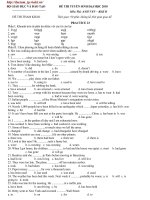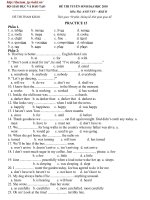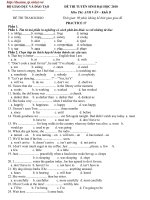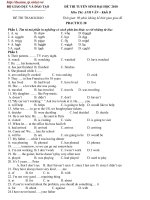LT cấp tốc Anh 2010 số 51
Bạn đang xem bản rút gọn của tài liệu. Xem và tải ngay bản đầy đủ của tài liệu tại đây (163.47 KB, 5 trang )
http://ductam_tp.violet.vn/
BỘ GIÁO DỤC VÀ ĐÀO TẠO ĐỀ THI TUYỂN SINH ĐẠI HỌC 2010
Môn Thi: ANH VĂN – Khối D
ĐỀ THI THAM KHẢO Thời gian: 90 phút, không kể thời gian giao đề
Practice 23
Phần I. Khoanh tròn từ phát âm khác với các từ còn lại
1. live d helpe d use d robbe d
2. one won born month
3. swe e t me a t swea t fe a r
4. fa i r ha i r pa i r afra i d
5. blu e sho e s flu uniform
Phần II. Chọn phương án ñúng ñể hoàn thành những câu sau
6. She was walking down the street when suddenly she .............Peter.
a. saw b. was seeing c. saw d. see
7. I ...................what you mean but I don’t agree with you.
a. have been seeing b. had seen c. am seeing d. see
8. Tom doesn’t like dancing, but Mike .................
a. does b. did c. do d. doesn’t
9. A number of accidents in the last 2 years ................caused by drunk driving. a. were b. have
been c. have d. are
10. We .................play chess with our father.
a. use to b. using to c. used to d. have used to
11. They ..................for robbing the bank.
a. have arrested b. are arrested c. were arrested d. have been arrested
12. Tony ....................a strap with his trousers because they were too loose. a. has to wear b. had
been wearing c. had to wear d. were wearing
13. Italian people ...................of the Prime Minister’s resignation on television.
a. was told b. will tell c. have been told d. will be telling
14. Nearly 1,000 people have been killed in an earthquake which .........Japan yesterday. a. has hit b. was
hitting c. hit d. had hit
15. It can’t have been Bill you met at the party last night. He ..................China. a. has been to b. was
in c. will be d. has gone
16. I ...............in the garden all day and I am exhausted now.
a. has worked b. have been working c. had worked d. was working
17. Some of them ......................so much since we left the army.
a. changed b. did change c. had changedd. have changed
18. Many scientists are sure ................life on other planets.
a. there was b. there had been c. there are d. there is
19. Look at that men! He ..............such a funny hat.
a. wore b. is wearing c. was wearing d. wears
20. When I got home, the children .....................to bed and the house was quiet. a. went b. had gone
c. has gone d. will go
21. Beatrice said she ..............in Paris before moving to Barcelona.
a. had lived b. was living c. has live d. will live
22. They were too late. The plane ................off ten minutes earlier.
a. took b. had taken c. has taken d. was taking
23. Paper money ..................for over a thousand years.
a. has been used b. has used c. was used d. used
24. The weather has been bad this week. Next week it .............probably be worse. a. is b. will c. is
going to d. must
25. John was late for the meeting. He .................in a traffic jam.
a. have been b. am driving c. be d. has been held
26. Hetty went to New York and invested .............Wall Street.
a. in b. on c. for d. to
http://ductam_tp.violet.vn/
27. I spoke to her .................the phone last week.
a. on b. in c. at d. by
28. Why did you open my letter?. – I’m sorry. I did it ...............mistake. a. about b. on c.
by d. in
29. I live ..................the third floor.
a. on b. above c. at d. in
30. ................Saturday night we went to a party.
a. In b. On c. At d. To
31. Maria is ...............her sister in many ways. They are both tall and thin. a. from b. for c.
with d. like
32. The bank is ................the corner of Lower Road and Hill Road.
a. in b. on c. at d. from
33. He gave ....................his job last week.
a. to b. to c. up d. from
34. We’ll stay in the United State until our visa runs ............
a. up b. out c. off d. away
35. It is important for you to succeed .......................your career.
a. on b. with c. about d. in
36. She made me .................for the petrol, but she allowed me .............her car all day. a. pay/ use b. to pay/
to use c. pay/ to use d. pay/ using
37. Sorry, you ................to touch that antique vase.
a. can b. can’t c. are not allowed d. must
38. Ann agreed to stay behind; she was used to ....................late.
a. work b. working c. worked d. works
39. She decided .................her new life.
a. starting b. to start c. started d. start
40. I don’t mind.................., but I try not to do it when possible.
a. cook b. to cook c. cooking d. cooked
41. Don’t let him .................our house.
a. to enter b. enter c. entering d. enters
42. He failed ......................his problem.
a. solves b. solving c. solve d. to solve
43. We look forward ......................you on the thirteen.
a. to see b. see c. to seeing d. seeing
44. I tried ...................down the mountain, but it was too steep.
a. ski b. to ski c. skiing d. to skiing
45. I need a recipe for a cake that’s easy .....................
a. make b. to make c. making d. for making
46. The disco was so ..............that you couldn’t hear yourself speak.
a. noise b. noisily c. noisy d. noising
47. She had a car crash because of her ............................
a. careful b. careless c. care d. carelessness
48. My sister smiled ....................when she received your present.
a. happily b. happy c. happiness d. unhappy
49. He is my sister’s son. He is my ...................
a. nephew b. niece c. son d. cousin
50. A.......................provides legal advice.
a. architect b. lawyer c. decorator d. shop assistant
51. The TV programme was so ....................that I fell asleep.
a. bored b. bore c. boring d. interested
52. I failed my exam. I worked hare for it. I’m so ......................
a. disappoint b. disappointing c. disappointingly d. disappointed
53. Could I .....................on these shoes, please?
a. fill b. put c. look d. try
http://ductam_tp.violet.vn/
54. She .................off her horse and hurt her wrist.
a. fell b. turned c. put d. gave
55. They .............that Mary left last week.
a. tell b. told c. said d. say
56. When I was a child I ....................allowed to go out late at night. a. were b. did
not c. was not d. had not
57. If I ..............the lottery, I would give most to charity.
a. win b. won c. will win d. had won
58. I’m coming to London tomorrow. I’ll ring you ..............I arrive.
a. if b. when c. before d. until
59. We can stay with my American cousins ................we are in Los Angeles. a. while b. as
soon as c. until d. after
60. Two pictures .....................from the museum last night.
a. were steal b. have been stolen c. stolen d. were stolen
61. Three new factories .........................this year.
a. have built b. have been built c. were built d. built
62. If you stop smoking, you ............... more money.
a. won’t have b. will have c. would have d. wouldn’t have
63. 10,000 cars ........................next year.
a. are produced b. be produced c. produce d. will be produced
64. Someone ....................my bag!.
a. has stolen b. has been stolen c. have stolen d. have been stolen
65. You are reading the book .......................I wanted to read.
a. where b. who c. that d. when
66. Tom was late for work because he ...................the bus.
a. lost b. passed c. missed d. caught
67. You have to go on a diet if you want to ..................weight.
a. lose b.
keep
c. get d. reduce
68. .................hello to your parents from me when you see them. a. tell b. talk c.
speak d. say
69. She ...................a complaint to the manager because our meal was so bad. a. gives b. does c.
makes d. tells
70. This is my grandfather’s watch. He ..............it everyday until he died. a. carried b.
took c. wore d. brought
71. Surely, some of .................times of my life have been spent in our kitchen.
a. happiest b. the happiest c. the most happy d. most happy
72. John said that no other car could go ........................his car.
a. so fast like b. as fast as c. fast than d. as fastly as
73. Tom is ...................intelligent in our class.
a. the more b. the best c. the most d. most
74. Trains in London are ..................... in Paris.
a. more crowded than b. as crowded as c. less crowded as d. as crowded than
75. My homework is ................than yours.
a. worst b. worse c. badder d. more bad
Phan III. Chon phuong an ung voi tu hoac cum tu co gach chan can phai sua.
76. I l a st w e nt to the cinema s i n c e three weeks a g o .
A B C D
77. W h e n have you h a d your n e w h a i r s t y l e ?
A B C D
78. Twenty-four i s e nou g h old t o live with his p a re n t s .
A B C
D
79. There was a n ac c i d e n t , but u n f o r t u n a t e l y no one was s e r i ous i n j u r e d .
A B C
D
80. T h e sofa was s u c h comfortable that I fe l l a s l ee p .
http://ductam_tp.violet.vn/
A B C
D
IV.
ð
ọc
kỹ 4 ñoạn văn sau và chọn phương án ñúng.
Question 81- 85
How can we keep our teeth healthy? First, we ought to visit our dentist twice a year. He can fill the small
holes in our teeth before they destroy the teeth. He can examine our teeth to check that they are growing in the right
way. Unfortunately, many people wait until they have toothache before they see a dentist. Secondly, we should
brush our teeth with a toothbrush and flouride toothpaste at least twice a day, once after breakfast and once before
we go to bed. We can also use wooden toothpicks to clean between our teeth after a meal. Thirdly, we should eat
food that is good for our teeth and our body: milk, cheese, fish, brown bread, potatoes, red rice, vegetables and
fresh fruit. Chocolate, sweets, biscuits and cakes are bad, especially when we eat them between meals. They
are harmful because they stick to our teeth and cause decay.
81. How often should we go to the dentist?
a. once a month b. twice a month c. once a year d. twice a year
82. Only when do a lot of people visit a dentist?
a. when we keep our teeth healthy b. when they have toothache c. when they
destroy the teeth d. when they are free
83. How often ought we to clean our teeth?
a. at least twice a day b. only twice a day c. at least twice a month d. only twice a year
84. What shouldn’t we eat a lot?
a. sweets, cakes b. chocolate, biscuits c. cheese, brown bread d. sugar
85. Why aren’t sweets good for our teeth?
a. they have a lot of sugar b. they cause decay c. they are expensive d. they are bad
Question 86-90
Language, the way we express ourselves, is a vital part of learning. A baby learns his native tongue naturally
by hearing speech around him. If the speech he hears is rapid, not clear and never directed at him then he learns
slowly and speaks badly. A child of two or three who can’t make his desires known or put his thoughts into words
will usually become angry. His relationships with other get worse. If the speech a baby hears around him is clear,
and his family talk to him, he will gain a satisfactory command of language directly, by his mother, his language
ability will be greater. By the time he is two, it is quite possible for him to have a vocabulary of two thousand words
and by the time he is three he will be able to read. Once ahead he will stay ahead.
16. How is language defined by the writer?
a. Language is the way we express ourselves b. Language is a vital part of learning
c. Language is what we say d. Language is what we write
87. How does a baby learn his mother tongue?
a. by listening to radio b. by reading books c. by hearing what is said around him
d. by watching TV
88. How does the child usually react when he can’t express himself?
a. he will get worse b. he will get angry c. he won’t talk d. he will be better
89.How should the mother talk to her baby?
a. clearly, directly b. clearly, indirectly c. rapidly, clearly d. slowly, indirectly
90. How many words does a baby at the age of two can acquire?
a. 20 words b. 200 words c. 2,000 words d. 20, 000 words
Question 91 – 95
Romantic love is often the basis for marriage in Australia; young adults meet their future spouses at school,
at jobs and in organizations and religious institutions. Although children choose their own spouses, they still hope
their parents would approve of their choices. In many families, parents feel that children should make major life
decisions by themselves. A parent might try to influence a child to follow a particular profession but the child is free
to choose another career. Sometimes children do precisely the opposite of what their parents want in order to assert
their independence.
91. What is often the basis for marriage in Australia?
a. practical love b. romantic love c. great love d. love at the first sight
92. Children want their parents to .....................
a. disagree with their choices b. consider their choices
c. agree with their choices d. notice about their choices
http://ductam_tp.violet.vn/
93. What, according to many parents, children should do?
a. depend on parents b. ask parents when they want to make major decisions c. make their
own major life decisions d. ask their friends
94. In choosing career, children..............
a. can choose what career they like b. can’t choose what career they like c. be under
influence of their parents d. must follow their parents’ ideas
95. The passage is about
a. young children b. young adults’ choices of their marriage and career c. the role of
parents in children’s decisions in Australia
d. the role of young children question 96-
100
The Japanese have perhaps the strictest rules of social and business behaviour. Seniority is very
important, and a younger man should never be sent to complete a business deal with an older Japanese man. It is also
important to exchange business cards immediately on meeting because it is essential to establish everyone’s position.
when it is handed to a person in a superior position, it must be given and received with both hands, and you must
take time to read it carefully, and not just put it in your pocket. You should not expect the Japanese to shake hands.
Bowing the head is a mark of respect, and the first bow of the day should be lower than when you meet thereafter.
96. What strict rules do the Japanese have?
a. rules of society b. rules of social behaviour c. rules of business d. both b and c
97. When should you exchange business card with Japanese businessmen?
a. after meeting b. before meeting c. immediately on meeting d. late on meeting
98. How should a business card be handed?
a. with both hands b. with one hand
c. in a superior position with both hands d. in a superior position with one hand
99. Japanese businessmen expect .................... people to do business deals with him a. younger b. much
younger c. much older d. the same age or older
100. The Japanese greet each other by................
a. shaking hands b. saying something c. bowing the head d. smiling









